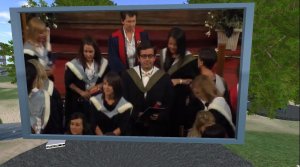(photo courtesy of Clara O’Shea via Second Life graduation at the University of Edinburgh)
I am currently weaving my way through the northern English countryside (Durham to be exact) and reflecting on the events of the last 48 hours or so, the most notable being graduating from the University of Edinburgh with a Masters in Elearning. The program was an online one and this was the first opportunity I had to see the physical university and campus and, as it turned out, a good deal of the faculty, staff, and fellow students. I walked, sat in the first row, and took endless photos of me, my gown, and the surrounding architecture. I was dinged on the head with a cap to signify my graduation and as legend would have it, this cap was made from the trousers of John Knox. So all was well there.
But why was participating in the ceremony a necessity? Not sure. One of my instructors had asked me why this was so important to some of us as several had flown considerable distances to get there (Greece, US for me, etc.). He said it was essentially meaningless and that can’t logically be argued against. It wasn’t an official transference of position, but a pilgrimage. We all came with some sort of desire to participate in ceremony, some formality that would perhaps tie this experience, in all its considerable exploration of virtual time, space, and consciousness, with our waking lives both on and offline. Perhaps it was a last hoorah before returning to non-studentness, a capstone to a relatively profound experience. Perhaps it was a recognition, at least by me, that I live in a world outside ceremony and general formality. I make a living with deadlines, constructs, deliverables, just like everyone else. But I live with them and without them. I push on an envelope occasionally of my own creation and the ceremony I participate in are the ones of my own mental construction (my wife would beg to differ). I am generally a self-starter, a self-creator and that can be tiring work. I organize and plan incessantly creating my own experiences (this train from Edinburgh to London being one of these). So, it was refreshing to participate in someone else’s predetermined rituals and ceremonies, ones that I was irresistibly drawn to.
It was a pilgrimage, not a passage.
I laid the foundation for this journey years ago when I began the study, even well before. I have written before about knowing a place by using online media and I indeed recognized many of the streets in Edinburgh from their Street View parallel on Google Maps. I knew them to a point. And now I have experienced them, But it isn’t ultimately the sedentary structures and narrow passages (closes) that I came to appreciate. It was the steep climb to the University, the sweat building on the back of my neck as I reluctantly dragged our luggage around town to our hotel (my wife is frugal), the conversations on street corners with a professor, over a pint (Innes and Gunn being my favorite), over dinner with fellow students. Magic. I knew the place conceptually, but now I feel it a bit, I have experienced it. I own it to some degree. My memories are the relics of a saint that I return home with. A photo or two, a check-in, a nice thread on Facebook with those I have known for years, but just met. Your fellow pilgrims have all forged bonds. A pilgrim’s progress. So I had to participate in the ceremony. It called me from very far away.
Endlessly Departing
And now we depart. There’s the rub. In this redefined construct of human existence, this modern, mobile world of networks and connections and affinity circles, we must now embrace, or at least reintroduce ephemerality into our learning process. That affinity groups represent collaborative needs and wants and humanity and when they are depleted or met or fulfilled, we must separate. Permanence is not something to be romanticized or mythologized as it has been in the past. We must embrace these moments of ephemeral activity, that frenzy of shared goals and collective will; they are the most pregnant of spaces for learning. But they end, suddenly, often unexpectedly and we must build others to catapult us further along towards understanding. So, I wish my colleagues, classmates, instructors, and the University itself all the best. I will forever be a proud alumni and will forever drop everything for a chance at a shared project on emerging learning environments, or the importance of geography in Elearning, or even how awesome maps are as learning spaces (I would substitute pedagogical or constructivist to sound more academic there). I fully expect to maintain a working relationship with Edinburgh and am quite curious to investigate what it means to be an alumni of an online program (it is different, almost dramatically so). But our paths meander a bit here. Better for it. Sad to see everyone go. Endlessly departing. Endless, incessantly eyeing the emerging horizon.

Virtual is great — but there is nothing like ‘being there’ and meeting ‘in person’! Kind regards, Deborah